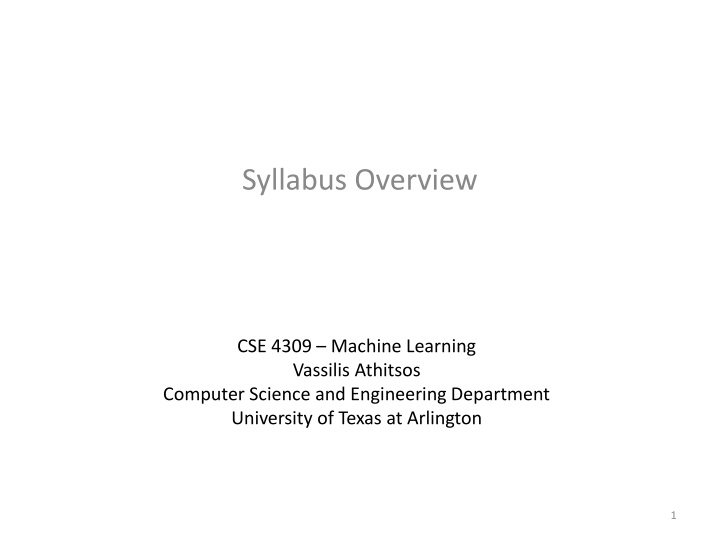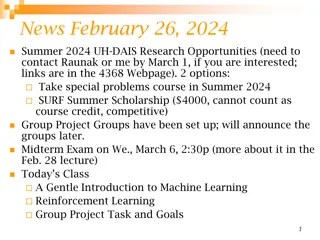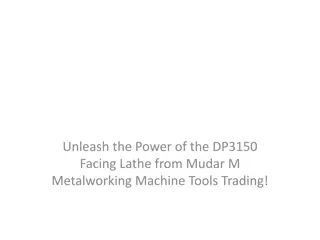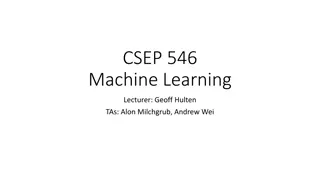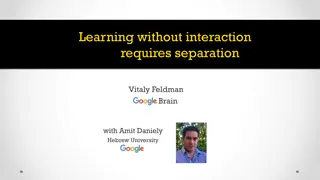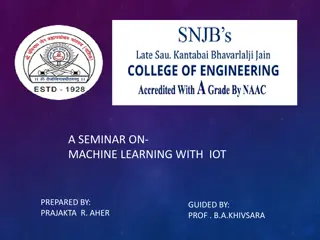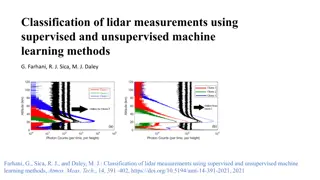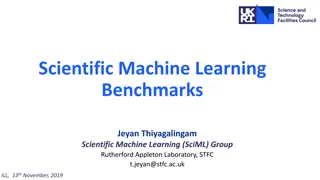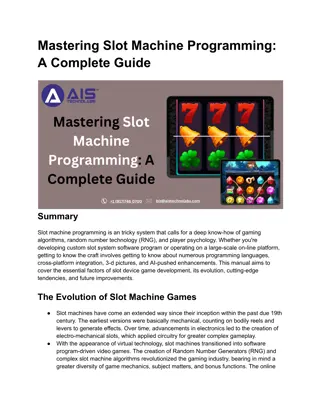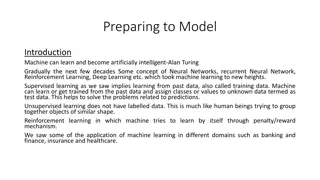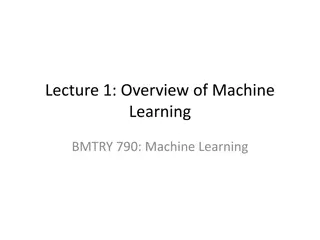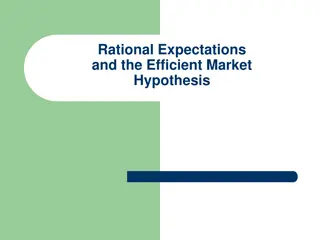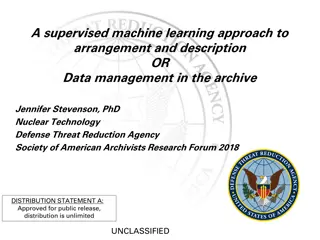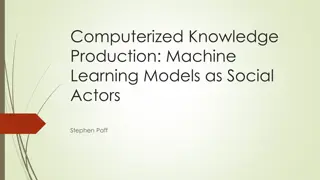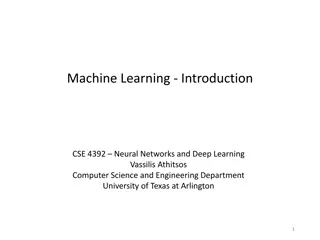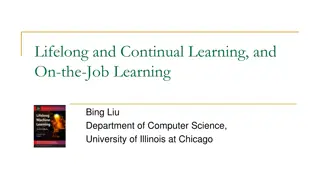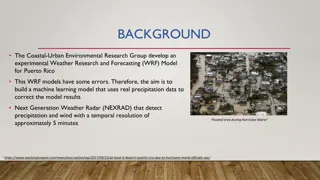Introduction to Machine Learning - Course Overview and Expectations
This course provides an introduction to machine learning, covering fundamental concepts and expectations. Topics include probability, statistics, calculus, linear algebra, algorithms, programming, and real-world preparation for professional life. Expectations include a solid background in probability, statistics, algorithms, linear algebra, and programming. Assignments validate knowledge in algorithms, calculus, probability, and linear algebra. Prepare for real-world responsibilities and evaluations based on work quality.
Download Presentation

Please find below an Image/Link to download the presentation.
The content on the website is provided AS IS for your information and personal use only. It may not be sold, licensed, or shared on other websites without obtaining consent from the author.If you encounter any issues during the download, it is possible that the publisher has removed the file from their server.
You are allowed to download the files provided on this website for personal or commercial use, subject to the condition that they are used lawfully. All files are the property of their respective owners.
The content on the website is provided AS IS for your information and personal use only. It may not be sold, licensed, or shared on other websites without obtaining consent from the author.
E N D
Presentation Transcript
Syllabus Overview CSE 4309 Machine Learning Vassilis Athitsos Computer Science and Engineering Department University of Texas at Arlington 1
About the Course This course is aimed to be an introduction to machine learning. Expectations: Basic understanding of probability and statistics. Calculus (derivatives, integrals, gradient vectors). Linear algebra (vector and matrix operations). Solid algorithmic background. Solid programming background. 2
Expectations: Statistics You are expected to have a basic understanding of: Probabilities. Probability densities. Joint probabilities. Conditional probabilities. Prerequisites: IE 3301 (probabilities). 3
Expectations: Algorithms and Linear Algebra. You should be able to analyze the space and time complexity of various algorithms. You are expected to understand big-Oh notation (and Theta notation, Omega notation, etc). You are expected to understand and be able to use/implement basic data structures: linked lists, priority queues, trees, graphs. You should be familiar with matrix operations. Prerequisites: CSE 3318 (algorithms), used to be CSE 2320. CSE 3380 or Math 3330 (linear algebra). 4
Expectations: Programming You are expected to be expert programmers. Being expert programmers means (among other things) that: You have no trouble converting pseudocode to real code. You can debug your own code. No programming or debugging help will be offered in this class. Programming assignments should be done in: Python 3.8.3 numpy version 1.18.5 5
Assignment 1 Already on Canvas. Due Thursday next week. Assignment 1 is there to verify that you have an adequate knowledge of the required background in algorithms, calculus, probability, and linear algebra. If you do not have the right background, the assignment gives you the opportunity to do something about it: Review the material. Discuss with the instructor how to better prepare. Drop the class if you find it necessary. 6
Preparing for the Real World I want the course to prepare, to the extent possible, students for professional life in the real world. In the real world there are rules and responsibilities. You are responsible for understanding the rules and carrying out your responsibilities. In the real world, your supervisors and your customers care about you getting the job done. Your evaluations will depend on the quality of your work. If you do not get the job done, nobody will care about the reasons or excuses. 7
Grading Grades depend exclusively on assignments. No homework scores will be dropped. All assignments are weighted equally. Little extra credit will be given. Any extra credit will be given to all students. Do not ask for individual extra credit opportunities to improve your grade. No make-up work will be given to individuals who want a better grade. 8
Grading Grading is based on performance. 90% = A, 80% = B, 70% = C, 60% = D. Grading criteria do not include: Effort. Class participation. What grade you need to qualify for financial aid, for a job, for graduation, etc. All requests for leniency in grading will be ignored. 9
Grading - FAQ (Towards the end of the semester) I would like a grade of X, but I am afraid I may get a grade of Y. What can I do? Answer: Make sure your assignment/exam scores exceed the threshold for grade X. If not, nothing else can be done. (At the end of the semester) I REALLY need a grade of X, but I got a grade of Y, which will cost me my ___ (fill in any choice of: job, financial aid, 4.0 GPA, self esteem ). Can I get bumped up? Or, can I get make- up work? Or, extra credit work? Or something? Answer: No. 10
Grading - Recap If your goal is an easy A (or an easy B, or an easy C), this may not be the right class for you. If your goal is a light course load, this may not be the right class for you. This is one of the most advanced courses we offer. You decide if you want to take it. Machine learning has become an extremely important computer science area. The goal is to train students to be competitive for the most demanding machine learning jobs out there. This goal is not compatible with either easy grading or light workload. 11
Assignments You must submit on Canvas. Late penalty: 4 points per hour. No exceptions, except for medical/personal emergencies documented in writing. Network/computer crashes will not be accepted as an excuse. Every semester, some people get 0 in an assignment (or more), because they submitted the wrong file(s). Then they ask for leniency, because they did all the work, and just made a silly mistake in submitting. Sorry, there will be no leniency on this issue. Verify your submission every time. 12
Regarding Submission Problems If, for whatever reason, you cannot submit on Canvas, then you can send us your assignment by e-mail. In that case, e-mail (before the deadline) your submission files to me and to the teaching assistant. If you e-mail us after the deadline, you still get the late penalty. Use your UTA e-mail, so that you can prove that you sent your message on time. Check with us ASAP to make sure we received your e-mail. You will still need to provide ASAP very convincing documentation that you really had problems with Blackboard. 13
Attendance You do not have to attend lectures. However, if you do not attend lectures, you are still responsible for understanding the material. Do not expect a private lecture during office hours or by e- mail. 14
Class Participation Class participation is not part of the grading criteria. However: asking questions, and trying to answer questions, can help you in understanding the material. If you have questions and you do not ask in class, where are you going to get the answers? If you do not understand something, always feel free to raise your hand and ask a question. 15
Course Website http://vlm1.uta.edu/~athitsos/courses/cse4309_fall2020/ The course website will be the main source of information for this class. The link to the course website is posted on Canvas and on my home page. Canvas will only be used for assignment submissions All other material will be available on the course website. The schedule and lecture slides, will be available on the "Schedule and Lecture Slides" link. Assignments will be available on the "Assignments" link. 16
Syllabus A link to the syllabus is posted on Canvas and on the course website. There are detailed policies on grading, submissions, etc. You are responsible for reading and understanding what the syllabus says. Do not ask for exceptions from any syllabus policy. If you did not read, or did not understand the syllabus, you are responsible for the consequences. See comments earlier on getting ready for the real world. 17
Getting Help (1) The teaching assistant and myself are available for help. Feel free to use our office hours (on Microsoft Teams), posted on the website. Feel free to send e-mails with your questions. If you send us an e-mail, always CC the TA and me, to maximize chances of getting a reply fast. Do not expect responses to frantic queries in the last minutes/hours before an assignment is due. If you send us assignment-related questions the day that the assignment is due, we may not manage to respond to you before the deadline. The earlier you start, the more chances you will have to ask questions, and to get your questions answered. 18
Getting Help (2) The instructor and TA duties do not include programming help and debugging. (See comments earlier on preparing students for the real world outside the university.) Personally, I just cannot look at your code for a few minutes and spot bugs. So, it is not that we do not want to help, but that (usually) we cannot. 19
Using Existing Libraries/Tools (1) Every semester, I get many questions of the type: Can I use this existing library/tool for the assignment ? Answer: I do not know. Use at your own risk. Assignments specify that you need to implement specific methods and report specific results. Instructions for how to implement those specific methods are provided on the assignment page and on the course slides. I expect, and I recommend, that you implement the specified methods from scratch, using the provided instructions. Existing libraries/tools may implement variations that, while reasonable and useful, do not match the specifications on the assignment. If that happens, it will count as wrong. 20
Using Existing Libraries/Tools (2) If you use existing libraries/tools: If your output complies exactly to the assignment specifications, great! If not, it will count as wrong. Do not blame the library or tool, you made the choice to use it. The teaching assistant and I will not spend time to check if your proposed library/tool complies with the assignment specifications. We do not recommend the usage of such tools anyway, so we have no reason to help you do it. Implementing methods from scratch provides a different level of understanding than simply using existing libraries. This is why we recommend implementations from scratch. Assignments are also the basis for the semester grade. To get a good grade, you should be able to understand and implement the concepts discussed in the slides. 21
Assignment-Related Questions Assignments are used to evaluate performance. You are free to ask any assignment-related question, at any time, but we may not give an answer. Before the deadline, we may not answer some questions, if we judge that figuring out those answers is part of your evaluation for that assignment. After the deadline, we will answer any questions. Overall, you should always feel free to ask a question. Sometimes, instructions or slides may have an ambiguity. Your questions can help us identify and resolve such ambiguities. If in doubt, ask. If we feel that we can only answer after the deadline, we will let you know. We will never hold it against you that you asked a question. 22
Electronic Communication Please use your UTA e-mail for electronic communication with the instructor and the teaching assistant. We monitor chat on Teams ONLY during lecture and office hours. We may not notice messages you post outside those hours, or we may respond very late. We do not monitor any other means of communication (Canvas, MyMav, ). If you make comments on Canvas, we will assume that they are notes to yourself. 23
